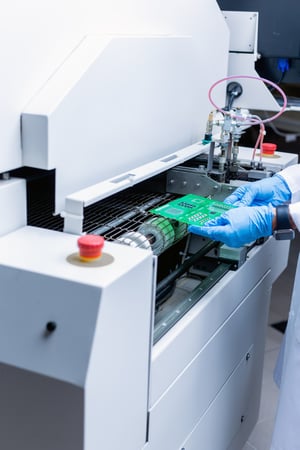Have you ever baked a dish in your oven that presented you with a cleaning challenge? For most people, cleaning that black and brown burnt on crust that sometimes covers the dish can be our least favorite part of the process. The effort to clean it though is often dependent on things like the pan’s coating, how much it has been used, what we’re cooking and how long it cooks. No matter what you baked, you want to make sure that your dish is clean for the next time you’re making something.
 PCBs get baked too. The fundamental process in PCB assembly is the soldering process. Often times, this process includes the use of reflow ovens, wave solder equipment, or other baking processes. Sequential or repeat applications of any of these processes subjects the board to multiple thermal cycles.
PCBs get baked too. The fundamental process in PCB assembly is the soldering process. Often times, this process includes the use of reflow ovens, wave solder equipment, or other baking processes. Sequential or repeat applications of any of these processes subjects the board to multiple thermal cycles.
The decision to use multiple thermal cycles depends on a few things. How is the PCB is processed? Does your process use a reflow oven as well as a wave solder system? The board’s complexity in terms of using stacked components or double-sided circuitry may require multiple reflows. If underfills are being used to improve the package’s mechanical and thermal properties, typically they require a baking process for curing.
If you do have multiple thermal cycles, you’ll encounter burnt-in flux residues that are significantly more difficult to clean if a PCB cleaning process is not implemented after each thermal cycle. The difficulty in cleaning will also vary based on the type of flux that is used such as no-clean, water-soluble, or RMA.
For optimal results, your process would ideally include a cleaning stage immediately following each thermal cycle. PCB cleaning effectiveness following multiple thermal cycles is greatly affected by solder paste type and cleaning agent selection.
In our earlier baking dish example, there are several variables that affect how long you’ll be scrubbing over the sink. The same holds true when manufacturing PCBs. Understanding the details of your process, and specifically, the impact of multiple thermal cycles on PCB cleaning efficacy is critical.
Interested in learning more? Join us on June 21st at 11:00am EDT for a FREE webinar entitled Multiple Thermal Cycles in which we will thoroughly examine the impact of multiple thermal cycles on the effectiveness of the PCB cleaning process.
_1.png)



